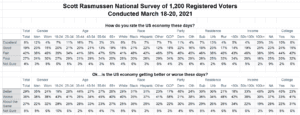Twenty-eight percent (28%) of voters nationwide say their own personal finances are getting better. A Scott Rasmussen national survey found that 20% take the opposite view and their finances are getting worse. Forty-nine percent (49%) say their finances are remaining about the same while 2% are not sure.
Those figures reflect a significant improvement over the past couple of months. In January, just 19% thought their finances were getting better while 26% said they were getting worse. The improved economic confidence has come along with a rapidly growing belief that the worst of the pandemic is behind us.
In fact, the most recent figures have finally surpassed the pre-election levels of confidence. Last October, 27% believed the economy was getting better (25% said worse). Between the election and January, however, concerns about the pandemic grew rapidly. That was matched by a sharp decline in economic confidence.
However, since October, the partisan dynamics have changed. Prior to the election, Republicans were far more upbeat than Democrats. At that time, 43% of GOP voters said their finances were getting better while just 14% said they were getting worse. Now, Republicans are evenly divided (23% better, 21% worse).
In October, by a 31% to 18% margin, Democrats said their finances were getting worse. Now, by a 36% to 15% margin, they offer an optimistic assessment.
Independents were slightly negative last fall and are evenly divided today.
As for an educational divide, those with a college degree are fairly upbeat today while those without are evenly divided.
The survey also found that:
- 27% rate the U.S. economy as good or excellent, another 27% say poor.
- 29% believe the economy is getting better while 38% say worse.
- 47% rate their personal finances as good or excellent, 16% say poor.
SIGN UP to receive Scott’s free email newsletter.
CHECK OUT Scott’s latest polls.
Note: Neither Scott Rasmussen, ScottRasmussen.com, nor RMG Research, Inc. have any affiliation with Rasmussen Reports. While Scott Rasmussen founded that firm, he left more than seven years ago and has had no involvement since that time.
Methodology
The survey of 1,200 Registered Voters was conducted by Scott Rasmussen using a mixed mode approach from March 18-20, 2021. Field work for the survey was conducted by RMG Research, Inc. Most respondents were contacted online or via text while 201 were contacted using automated phone polling techniques. Online respondents were selected from a list of Registered Voters and through a process of Random Digital Engagement. Certain quotas were applied, and the sample was lightly weighted by geography, gender, age, race, education, and political party to reasonably reflect the nation’s population of Registered Voters. Other variables were reviewed to ensure that the final sample is representative of that population.




